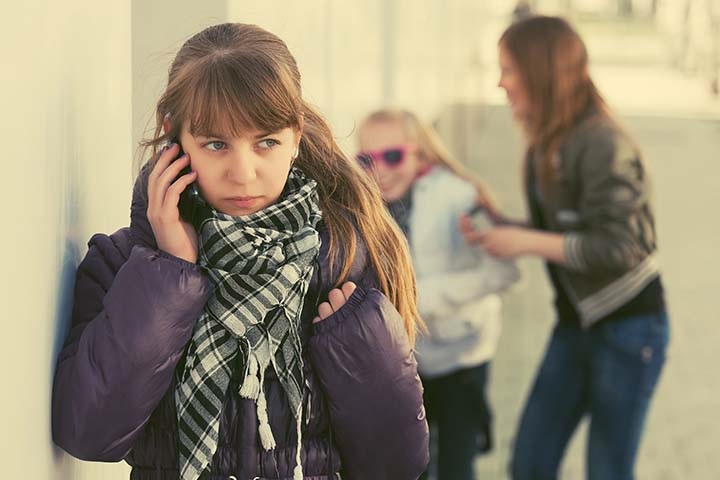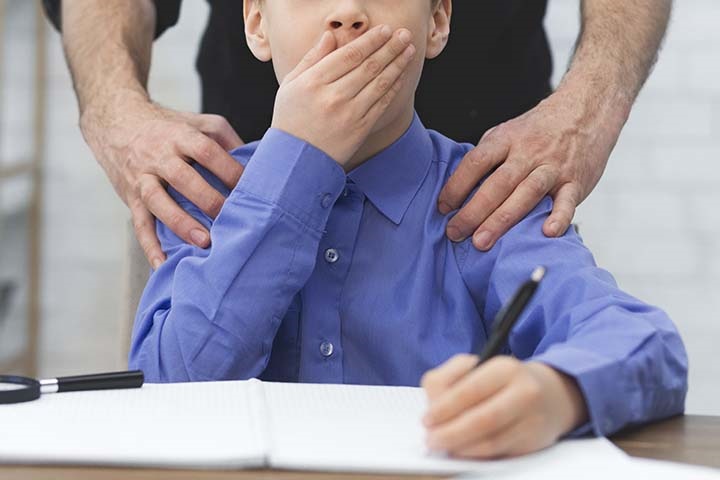
Image: Shutterstock
As a parent, it’s natural to want to keep your kids safe. But unfortunately, it’s not always easy to know which safety tips are the best for keeping them secure. While there are many popular and widely known safety tips that everyone should follow, some less well-known ones will also help keep your children safe from harm. And these tips will definitely guide them when you are not around. In this article, we’ll discuss the 4 best tips to make your kids feel confident and safe from unwanted threats that might even be masked as someone they are comfortable with.
1. Give Them A “Whom To Trust List”
Image: Shutterstock
It can be difficult for parents to know how to talk about strangers with their kids. Many times, it’s easier to tell them not to talk with anyone they don’t know. But unfortunately, that isn’t the most effective way to protect your children from unwanted harm or danger. So instead of relying on a blanket statement like “Don’t talk with strangers!” you should give your children a list of people they can trust if needed.
The first person on this list should be family members such as grandparents, uncles, aunts, cousins, and other close relatives willing and able to help when needed. Also, include neighbors who have been around for some time that you feel comfortable leaving your children with while walking them down the street while you run errands nearby. These individuals could act as pseudo-guardians if something happened outside the house without parental supervision. Finally, teachers at school could serve as another source of safety if there is any issue during class hours when neither parent nor guardian is available. This would give students someone else besides themselves (or peers) whom they can turn to for help or support if necessary.
Providing kids with this kind of information ahead of time will ensure their security even when away from home by giving them options beyond simply avoiding contact altogether. Furthermore, it removes some fear by showing what types of people are safe to go towards instead of emphasizing staying away from everyone else. Additionally, having these names listed allows parents to practice talking openly about potential threats, reinforcing the idea of being aware of one’s surroundings rather than blindly trusting every stranger encountered along life’s journey.
2. Don’t Force Them To Get In Physical Touch With Relatives
Image: Shutterstock
Don’t force your kids to kiss, hug or cuddle with relatives or friends they don’t know. It’s an essential lesson for parents and caregivers to remember. Forcing a child into physical contact with someone they don’t feel comfortable around can be detrimental. Instead, foster a trusting relationship between the child and the relative.
Kids should have control over their bodies and decision-making, so parents must respect their boundaries regarding physical contact, like hugging or kissing strangers who may be distant family members. Parents must understand how difficult this situation can be for children, especially if there are language barriers, which could lead to even more confusion about what’s expected from them. This power imbalance between parents and kids puts them in vulnerable situations where consent isn’t necessarily respected by those older than them – something we must all strive not to allow to happen!
3. Teach Your Kids How To Use An Excuse To Avoid Uneasy Situations
Image: Shutterstock
Letting your kid use you as an excuse to avoid an uncomfortable situation can be tricky. On the one hand, children need to learn how to stand up for themselves and handle difficult situations without relying on someone else. But, on the other hand, sometimes it’s ok if they need a little help from their parents to escape uncomfortable or potentially dangerous situations.
If your child needs some help getting out of an awkward or unpleasant situation, there are ways that you can do this without troubling them too much. First and foremost, talk with your child about why they need help getting away from something – understanding what makes them so uneasy will give you better insight into how best to respond and support them while also helping them learn self-advocacy skills. Additionally, try different role-playing scenarios with them so that when faced with similar real-life circumstances, they’ll know exactly what steps should be taken next time!
Ultimately, letting kids use you as excuses isn’t ideal. Encouraging independence is vital here but remember: sometimes having a backup available doesn’t hurt either!
4. Tell Them Why It Isn’t Appropriate To Be Alone With A Teacher
Image: Shutterstock
Parents need to ensure that their children are safe when they are in the care of a teacher. For example, it is common for teachers and students to have one-on-one conversations, but such talks should be done with caution. In addition, parents should ensure that their child does not spend time alone with a teacher in a room or go to the teacher’s home without another adult present.
The primary reason why this precaution needs to be taken is that there have been cases where teachers have misbehaved with students while they were alone together. This could include physical contact, verbal abuse, or even sexual misconduct, which can leave lasting emotional scars on young people who experience these situations firsthand.
Parents need to talk openly and honestly about these issues with their kids so that they know what boundaries exist between them and any adults who may be involved in teaching them at school or outside of it and how best to protect themselves. Taking steps like this will help keep your children safe from harm now and into adulthood!
Overall, these four unpopular yet essential tips should be kept in mind by every parent looking out for their kid’s best interests regarding protecting against dangers lurking around us today! These may seem like small steps, but these measures together go a long way toward ensuring your child’s safety now and into adulthood! Let us know in the comments section below about a few more tips that are very handy but not so trendy regarding kids’ well-being.

















